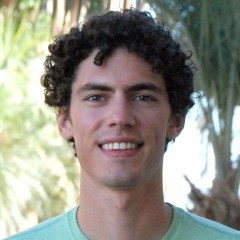
Date:
Location:
Speaker:
Title: Understanding and Optimizing Interactions of Functional Species in Mesostructured Materials with Diverse Transport Properties
Advisor: Brad Chmelka
Abstract
Mesostructured inorganic-organic hybrid materials have high interfacial areas, through-connecting mesoscale (2-50 nm) channels, and high mechanical and chemical robustnesses that can be exploited for diverse technological applications, especially those that involve the transport of charges, ions or molecules. These materials can, moreover, accommodate a broad assortment of functional molecular species that can mediate or instill transport properties. One interesting example is membrane proteins, which are biomacromolecules that transport ions or molecules across biological lipid bilayers at high rates and selectivities; for instance, the membrane protein proteorhodopsin actively transports H+-ions in response to light, which might be harnessed for solar-to-electrochemical energy conversion. Mesostructured inorganic-organic hybrid materials that include macroscopically aligned proteorhodopsin species are expected to generate bulk ion gradients across host materials under illumination. Here, a solution-based synthetic protocol is presented that allows high concentrations (up to 15 wt%) of active proteorhodopsin species to be incorporated within mesostructured silica membrane hosts. Synthesis conditions and compositions were selected to stabilize proteorhodopsin molecules in the presence of the structure-directing surfactant and soluble network-forming silica species that co-assemble to form mesostructured silica host matrices, as established by small-angle X-ray diffraction analyses. Multidimensional solid-state NMR spectra show that proteorhodopsin molecules incorporated within mesostructured silica hosts retain native-like structures, though with some interesting differences. The optical absorbance behaviors of proteorhodopsin guests in the synthetic mesostructured silica hosts correspond to the photochemical reaction cycles of proteorhodopsin in near-native environments that are associated with the active transport of H+-ions. The collective synthetic, structural and functional understanding developed here is leveraged to synthesize durable and optically transparent self-supporting mesostructured silica films that include high loadings of proteorhodopsin, as well as other membrane proteins. In separate mesostructured material systems, functional guest species at the mesostructure interfaces are shown to dramatically influence bulk material performances. Specifically, alkyl-fullerene functionalities at the mesochannel surfaces of mesoporous silica can substantially modify the sorption and release behaviors of pharmaceutical species from these materials, while interfacial alkyl functionalities in polymer:fullerene heterojunctions can promote efficient separation of photo-generated charges.
Everyone welcome!



